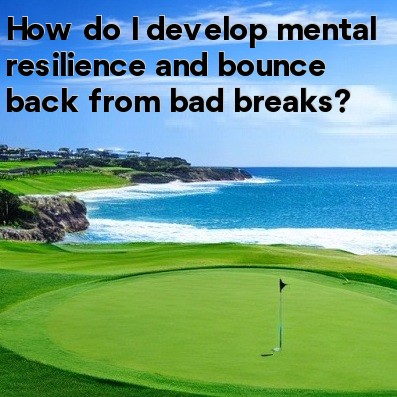
Developing Mental Resilience in Golf
Golf is a game of ups and downs, and it is inevitable that you will encounter bad breaks at some point. The key to becoming a successful golfer is not just about physical technique but also developing mental resilience. Here are some strategies to help you bounce back from bad breaks:
1. Stay focused and positive
Maintaining focus and a positive mindset is crucial in golf. Rather than dwelling on the bad break, focus on the present moment and the next shot. Remind yourself of your strengths and capabilities, and stay confident in your abilities. This positive mindset will help you overcome any setbacks.
2. Learn from mistakes
Instead of viewing bad breaks as failures, see them as learning opportunities. Analyze what went wrong, but do not dwell on it. Use the experience to identify areas where you can improve and make adjustments. Every bad break can be a stepping stone towards better performance in the future.
3. Control your emotions
Golf can be an emotional game, but it is important to stay in control of your emotions, especially after a bad break. Do not let frustration or anger consume you. Take a deep breath, acknowledge your emotions, and then refocus on the task at hand. Staying calm and composed will help you make better decisions on the course.
4. Practice mental visualization
Visualization is a powerful tool that can help you build mental resilience. Take a few moments before each shot to visualize your desired outcome. Picture the ball flying smoothly towards the target and landing exactly where you want it to. This mental rehearsal will help you stay focused and confident, even after a bad break.
5. Develop a pre-shot routine
A pre-shot routine is a series of actions and thoughts that you perform before each shot. It helps you establish consistency and can be a powerful tool for resetting your mind after a bad break. Create a routine that works for you and stick to it. This routine will help you regain focus and prevent negative thoughts from taking over.
6. Surround yourself with positive influences
Having a support system of positive influences can greatly contribute to your mental resilience. Surround yourself with people who support and encourage you, both on and off the course. Seek advice and guidance from experienced golfers, coaches, or mentors who can help you develop strategies for bouncing back after bad breaks.
7. Practice resilience off the course
Mental resilience is not limited to the golf course. Developing resilience in other areas of your life can also benefit your golf game. Engage in activities that challenge you mentally, such as meditation or problem-solving puzzles. This will help improve your ability to bounce back from setbacks and adapt to unexpected situations on the golf course.
Conclusion
Developing mental resilience in golf is essential for navigating the highs and lows of the game. By staying focused, learning from mistakes, controlling your emotions, practicing visualization, establishing a pre-shot routine, surrounding yourself with positive influences, and practicing resilience off the course, you will be better equipped to bounce back from bad breaks and perform at your best on the golf course.





